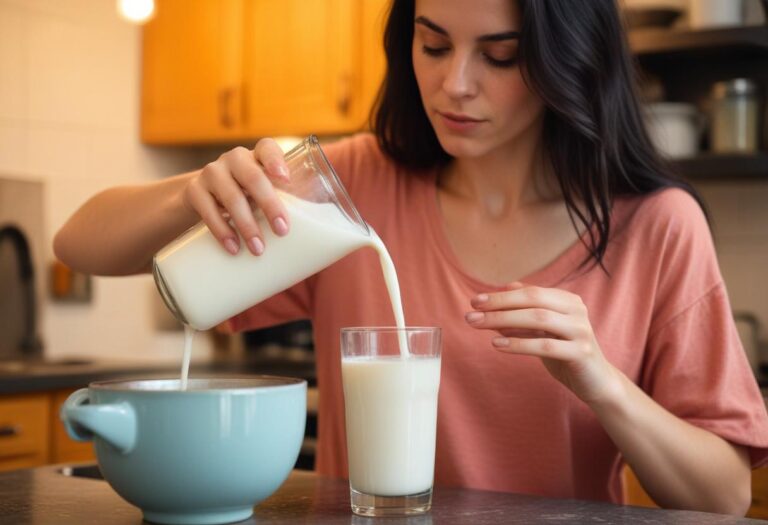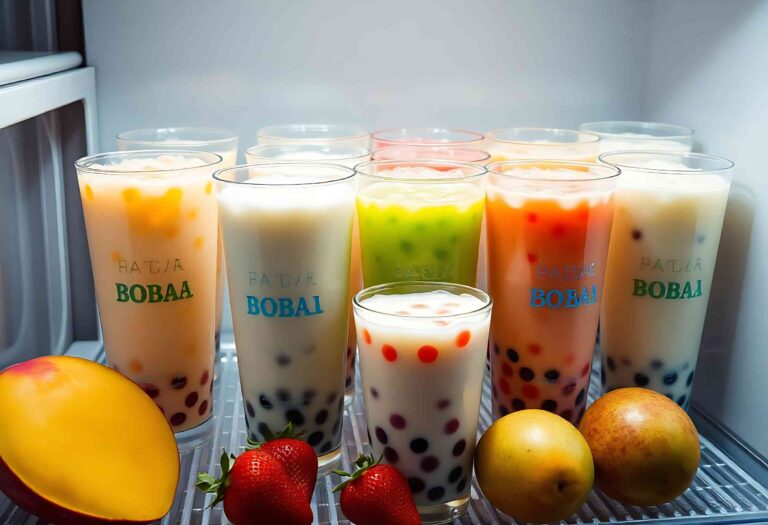Is Boba Tea Gluten Free? Essential Tips for Safe Enjoyment!
Is Boba Tea Gluten Free? Yes, boba tea is generally gluten-free. This popular drink, known for its chewy tapioca pearls and flavorful teas, has captured the hearts of many. But if you’re gluten-sensitive or celiac, it’s important to know what goes into your cup.
Most traditional boba tea ingredients are naturally gluten-free. However, some variations might include additives or flavorings that contain gluten. It’s essential to check labels and ask about specific ingredients when ordering.
In this article, you’ll discover everything you need to know about enjoying boba tea without worry while keeping your dietary needs in mind.
Key Takeaways
- Boba tea is generally gluten-free due to its main ingredients, including tea, milk, and tapioca pearls.
- Tapioca pearls are made from cassava root starch and do not contain gluten.
- While most flavorings in boba tea are gluten-free, always check labels for hidden sources of gluten in syrups or toppings.
- Cross-contamination can occur if boba tea is prepared in environments that also handle gluten-containing products; be cautious when ordering out.
- For a safer option, consider making boba tea at home where you can control all the ingredients and preparation methods.
Understanding Boba Tea
Boba tea is a popular drink that many people enjoy. It typically includes a tea base, milk or fruit flavor, and chewy tapioca pearls known as “boba.”
This drink can be served cold or hot, depending on your preference. The unique taste and texture of boba tea make it an exciting choice for those looking for something different.
What Is Boba Tea?
Boba tea combines various elements to create a refreshing beverage. It’s made with a tea base, which can be black, green, or oolong. You can choose between milk-based options or fruit-flavored versions.
The star ingredient is the tapioca pearls, which are gluten-free and add a fun chewiness to the drink. Many places offer customization options like adding jelly or pudding to enhance your experience.
- Tea Base: Black, green, or oolong teas serve as the foundation of boba tea. All these teas are naturally gluten-free.
- Milk Alternatives: Options such as almond milk, coconut milk, and soy milk provide creamy textures without gluten.
- Tapioca Pearls: Made from tapioca starch, these pearls are safe for those avoiding gluten.
- Flavorings: While most flavors used in boba tea are gluten-free, some specialty syrups may contain gluten. Always check labels when choosing flavors.
When enjoying boba tea, always consider the ingredients to ensure they meet your dietary needs.
Gluten and Its Sources
Gluten is a protein found in certain grains. Knowing its sources helps you avoid gluten if you’re sensitive or have celiac disease.
What Is Gluten?
Gluten is a mixture of proteins mainly found in wheat, barley, and rye. It gives dough its elasticity and helps bread rise. For people with gluten sensitivity or celiac disease, consuming gluten can lead to various health issues.
Foods That Contain Gluten
Many common foods contain gluten. Here’s a list of the main types:
- Pastas: Common forms include ravioli, dumplings, couscous, and gnocchi.
- Noodles: This includes ramen, udon, soba (those made only with buckwheat flour), chow mein, and egg noodles.
- Breads and Pastries: These items often include croissants, pita bread, naan, bagels, flatbreads, cornbread, potato bread, muffins, donuts, and rolls.
- Cereals: Many breakfast cereals contain wheat or barley as the main ingredients.
- Snacks: Chips or pretzels may use wheat flour for flavor or texture.
Always check labels when shopping for food products to ensure they are free from gluten-containing ingredients.
Also Read: Is Boba Tea Halal or Haram
Is Boba Tea Gluten Free?
Boba tea, also known as bubble tea, is generally gluten-free. Most of its main ingredients like tea, milk, and tapioca pearls don’t contain gluten. However, some toppings or syrups used for flavoring may include gluten.
Examining Boba Pearls
Boba pearls are made from tapioca starch, which comes from the cassava root. This means they are naturally gluten-free. The process of making boba pearls involves extracting starch from cassava and forming it into small pearls that you cook or boil. There’s no use of wheat or other grains that contain gluten in this process.
Evaluating Other Ingredients
Other key ingredients in boba tea such as tea and milk are also free from gluten. Traditional tea is safe for those with gluten sensitivities, while milk—whether dairy or non-dairy—is also gluten-free.
It’s important to note that some flavored syrups may add hidden sources of gluten, so always check ingredient labels before consuming your drink.
Cross-Contamination Concerns
Cross-contamination is a major issue when it comes to boba tea. This occurs when gluten-free ingredients come into contact with gluten-containing substances. It’s essential to be aware of this risk, especially in places that prepare both types of products.
Where Boba Is Made
The location where you buy your boba tea affects the likelihood of cross-contamination. If you choose a shop that also serves gluten-rich items, it increases the chance of exposure to gluten.
Homemade boba tea offers a safer option because you control all the ingredients and preparation methods. Always look for certified gluten-free products if you’re buying pre-made options or syrups.
How to Ensure Gluten-Free Preparation
To ensure your boba tea remains gluten-free, follow these steps:
- Check Ingredients: Always read labels on toppings and syrups for hidden gluten.
- Ask Questions: Inquire at restaurants about their preparation practices.
- Use Separate Equipment: Confirm that the equipment used for making your drink hasn’t been contaminated with gluten.
- Clean Surfaces Thoroughly: Make sure all surfaces and utensils are free from any trace of gluten before preparing your drink.
By taking these precautions, you can enjoy your boba tea without worrying about cross-contamination issues related to gluten.
Also Read: How to Make Boba Tea Taro
Conclusion
Boba tea can be a delicious gluten-free option when prepared correctly. It’s crucial to remain vigilant about the ingredients and preparation methods used.
By choosing trusted shops or making boba tea at home, you can enjoy this delightful beverage without worrying about gluten contamination.
Always ask questions and ensure that your drink is made with gluten-free practices in mind. With a little attention, you can indulge in boba tea while keeping your dietary needs intact.
Frequently Asked Questions
Is boba tea gluten-free?
Yes, boba tea is generally gluten-free. The main ingredients—tea, milk, and tapioca pearls—are typically gluten-free. However, it’s essential to check any toppings or syrups for gluten content.
What should I watch out for in boba tea?
Be cautious of cross-contamination when consuming boba tea. If the shop also serves gluten-rich items, there’s a risk that your drink could come into contact with gluten.
How can I ensure my boba tea is truly gluten-free?
To ensure your boba tea is gluten-free, ask about ingredient sources and preparation practices. It’s best to choose shops that use separate equipment and clean surfaces thoroughly.
Can homemade boba tea be safer?
Yes! Making homemade boba tea allows you to control ingredients and avoid cross-contamination risks associated with commercial shops serving both gluten-containing and gluten-free items.
Also Read:


